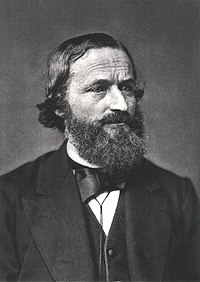Gustav Kirchhoff
German physicist (1824–1887)
Gustav Robert Kirchhoff (12 March 1824 – 17 October 1887) was a German physicist who contributed to the fundamental understanding of electrical circuits, spectroscopy, and radiation by heated objects. He coined the term black body radiation in 1862.[1]
Gustav Kirchhoff | |
|---|---|
 Gustav Kirchhoff | |
| Born | 12 March 1824 |
| Died | 17 October 1887 (aged 63) |
| Nationality | Prussian |
| Alma mater | University of Königsberg |
| Known for | Kirchhoff's circuit laws Kirchhoff's law of thermal radiation Kirchhoff's laws of spectroscopy Kirchhoff's law of thermochemistry |
| Awards | Rumford medal |
| Scientific career | |
| Fields | Physics |
| Institutions | University of Berlin University of Breslau University of Heidelberg |
| Doctoral advisor | Franz Ernst Neumann |
He proposed two sets of independent concepts in both circuit theory and thermal emission. They are all called 'Kirchhoff's laws' after him, as well as a law of thermochemistry. The Bunsen–Kirchhoff Award for spectroscopy is named after him and his colleague, Robert Bunsen. He also discovered rubidium with Bunsen in 1861.
References
change- ↑ A 'black body' is an idealised physical body which absorbs all electromagnetic radiation which strikes it, and reflects none. It is also the best possible emitter of thermal radiation (heat).